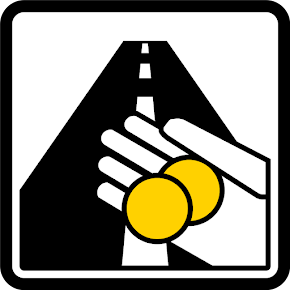You roll, they'll toll
We haven't heard too much about road tolls on Oregon highways lately, but you know they're coming. Governor Kohoutek made a splash back in May when she ordered the state transportation bureaucrats not to collect any tolls until 2026. But that was just to lull people to sleep. You can bet they're moving full speed ahead in setting the infernal things up, and they'll likely be starting the shakedown as soon as '26 gets here. It's probably more of a deadline than anything else.
The guv's order exempted the bridges on I-5 and I-205 between Portland and Vancouver, Washington, but the plan wasn't to start tolling them until spring 2026, anyway. It'll probably be something like $3 a pop to cross one of those spans. There's no telling what it will cost to cruise along on I-5 or I-205, and the bureaucrats are looking at some other "corridors," too. I would think Highway 26 west of downtown would be a prime candidate to join in the fun.
Between the two bridges, I gather they enable around 300,000 crossings on a weekday, and maybe 200,000 on a weekend day. At $3 a crossing, my crude math puts the haul from the tolls on the two bridges alone at something like $250 million a year. That ain't hay.
As a sort of sideshow to this, Lori Chavez-DeRemer, the rookie Republican Congressperson from Schraderland, has dropped a bill into the hopper in the House that would require a long federal study before any new tolls could be implemented just abut anywhere in the country. Her legislation will go nowhere, of course, but LCD is at that precious "I introduced a bill" stage of her career. The reps from the East Coast, where tolls are collected everywhere and have been since the dawn of time, will chuckle and smile politely for two seconds before round-filing their copy.
What may be the funniest part of the whole thing is that if you don't sign up for an electronic tracker to put in your vehicle, cameras are going to be the way the tolls are enforced. Given how many cars are parading around Portland every day with no license plates, or deliberately obscured license plates, and given that there is virtually no enforcement of any traffic rules in the city, there are going to be quite a few scofflaws who won't have to pay. Unless the Portland police go back to work, which I doubt will be happening between now and 2026. Only the law-abiding suckers will be bled.
The tolls on the interstate bridges won't be too much of a bother to me. If I go over one of them after 2025, it will probably be a one-way trip.
But it'll still be a sad day when they start charging. One of the things that attracted me to the West Coast were the marvelous networks of freeways. They won't be free too much longer.

Not free any more in CA either. Both NoCal and SoCal have highway tolls various places and the charges change depending on the time of day too.
ReplyDeleteAnd there are tolls in and around Seattle too.
Well, there ain’t no such thing as a free lunch.
ReplyDeleteHere’s the story from NJ for you:’
https://www.intransitionmag.org/Article/As-Gas-Tax-Loses-Power,-Mileage-Based-User-Fees-Mo.aspx
THE ICEBERG IS approaching. The tank is nearing empty. Choose any analogy you want, but the fact is clear: The gas tax, long the primary mechanism for funding surface transportation at the state and federal levels, is rapidly becoming obsolete.
Fuel tax revenues are being strained by a pair of market forces that are good news from an environmental perspective. First, passenger vehicles are far more fuel-efficient today than even a few years ago. In a May presentation to the New York Metropolitan Transportation Council, Eastern Transportation Coalition Director of Innovation Programs Virginia Reader estimated that a 2009 Toyota Camry consumed 25 miles per gallon (MPG) and contributed an average $278 annually in fuel taxes to Pennsylvania. A 2019 Camry owner would get 52 MPG and pay only $134 for driving the same distance.
Second, electric vehicles (EV) are beginning to take to American roads in high numbers and are projected to surpass internal combustion engine car sales in the 2030s. Their owners pay no gas tax at all.
In short, cars are putting a greater pounding than ever on roads and bridges, but paying less for their upkeep. Yet no one seems to be particularly worried about it. . . . (Much more at link)
EVs already pay fees at purchase and registration, at least in WA and OR, and probably most states, to compensate for the gas tax they won't be paying. So it's not really accurate to say they pay no gas tax at all.
DeleteThe comment was about “gas tax” — full EVs pay no gas tax by definition. The whole article is about the panoply of other ways to make up for the large and growing shortfall in gas taxes; those other fees you mention would be part of those.
DeleteWhen I run short on money, I adjust my spending.
ReplyDeleteThat concept doesn’t fit with a greedy bureaucracy.
In Oregon, like every state of the union, those "greedy bureaucracies" have indeed adjusted spending --- through the simple expedient of failing to maintain what we've (way over)built.
DeleteCities and states don't run deficits. They do borrow against future revenue expectations, and they have, because the electeds (not the bureaucrats) don't want to stop funding new stuff at the expense of ignoring the deterioration of the old stuff. We've got a highway and suburban roads system that was massively overbuilt, based on the assumption that we could expect endless cheap energy and infinite economic growth and that we could always ponzi scheme our way forward. All assumptions that have proven badly overoptimistic.
I have a question regarding your one-way trip....
ReplyDeleteIf you move somewhere, will you vote the same way that you did here?